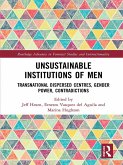Each chapter is accompanied by a brief response paper where a more senior researcher involves in conversation with respective chapter's content and shares reflections regarding Gender Studies, its integration, and developments. The first level corresponds with the significance of research in the field and its transformative power in and, crucially, outside the academia. The second relates to the value of networking and community building for doing research.
The book presents Gender Studies in a communicative, open manner that invites the reader to engage in and continue the displayed discussions. This book will be of interest to students and scholars of gender studies, sociology, queer studies, women's studies, trans studies, anthropology, and literary studies.
Dieser Download kann aus rechtlichen Gründen nur mit Rechnungsadresse in A, B, BG, CY, CZ, D, DK, EW, E, FIN, F, GR, HR, H, IRL, I, LT, L, LR, M, NL, PL, P, R, S, SLO, SK ausgeliefert werden.









